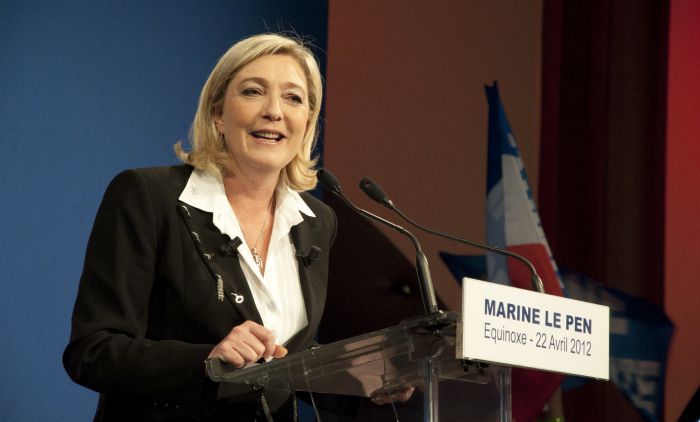Correct numbers alone cannot stop charismatic politicians using convincing narratives, even if the latter are based on “alternative facts.”

Kellyanne Conway, a counselor to President Trump, coined the phrase “alternative facts” to describe the White House press secretary’s obviously false statement that Trump’s inauguration had drawn “the largest audience to ever witness an inauguration.” The “alternative facts” concept took off as more and more politicians around the world have been caught making misleading or explicitly false statements.
During his campaign, Donald Trump claimed that crime in the US was “rising” and that it was “the highest in 47 years.” Just recently, on June 18, 2018, he made a similar claim about Germany: “Crime in Germany is way up.” In both countries, crime has been declining for many years. Similarly, Brexit campaigners used the “350 million pounds” number—arguing that this sum would be the weekly savings due to Brexit. Already during the campaign this claim was shown to be false; after the Brexit referendum the Leave campaigners themselves acknowledged that this was an exaggeration. During her televised debate for the runoff of the French presidential elections in 2017, Marine Le Pen made 19 false statements (according to the leading French newspaper Le Monde).
Mainstream media have woken up to the fact that a growing number of politicians are using “post-truth” narratives based on misleading or outright incorrect representations of reality. Media and NGOs have responded to alternative facts with fact-checking. They go through political speeches and manifestos and show which statements are false or misleading. Interestingly, despite these efforts, many politicians double down on their use of “alternative facts.” This suggests that even in the presence of fact-checking, alternative facts may bring political benefits.
One potential explanation for this puzzle is that the audience trusts the factual information from populist politicians more than the facts presented by media and non-partisan experts. It may well be the case that the populist base simply believes that the “technocratic elites” are biased against “the masses.” Indeed, according to a recent definition of populism (Mudde and Rovira Kaltwasser, 2017), the latter is an ideology considers the society to be ultimately separated into two homogeneous and antagonistic groups: the pure people and the corrupt elite. Populist voters may reject the elites as “self-serving.” Hence numbers coming from the elites (including media and experts) are more likely to be false than those that come from the populist politicians who are on the “people’s side.”
|
Politicians understand that voters have imperfect memory and limited computational capacity; therefore, they do not necessarily base their voting choices on numbers. Instead, they are convinced by arguments and narratives – from which they keep policy conclusions rather than numbers. |
The way to test this explanation is to run a randomized control trial where one treatment would subject the voters to alternative facts (the Alt-Facts treatment) while another treatment would supplement these alternative facts by facts by experts (Fact-Checking). To identify the causal effects of facts and alternative facts, there should also be another treatment (facts only, we will refer to it as Facts), and a control group (Control). Then the voters should be asked about their ex post beliefs about the world after the treatment. If voters are rational and have non-trivial confidence in the populist politicians, then Alt-Facts treatment should move their beliefs in the direction of alternative facts (relative to those of Control). The Facts should move their beliefs in the opposite direction. What would be the effect of Fact-Checking? If the voters have more trust in the statements of populist politicians than in those of experts, then after being exposed to both facts and alternative facts, they should shift their belief in the direction of populist statements (although not as far as after the Alt-Facts treatment).
In our recent paper (Barrera et al., 2018) we report the results from such an experiment that we ran during the French presidential campaign in March 2017. In this election, an extreme-right candidate, Marine Le Pen, came second in the first round (within just two percentage points of the winner, Emmanuel Macron) and received 34 percent in the runoff. In our experiment, administered online to a sample constructed to make it similar to a nationally representative sample of French voters, we used Le Pen’s quotes in which she intended to to convince the audience that refugees are actually economic immigrants and that immigrants come to France to enjoy its generous welfare system (rather than to work). To support her arguments, she used alternative facts: the allegedly high share of men among refugees and the claim that immigrants do not work. In the Fact-Checking treatment we supplemented her statements with factual information from the UN and from the French statistical agency showing that the share of men among refugees is much lower than she said and that employment rates among the French-born are only slightly higher than for immigrants.
We found that with regard to factual information French voters do behave rationally and they trust official sources more than Marine Le Pen. For example, Figure 1 represents the distribution of beliefs regarding the share of men among refugees. Le Pen claimed that it is 99 percent while the correct share is 58 percent. Exposure to Alt-Facts only moves many voters in the direction of 99 percent (relative to the Control group). Exposure to Facts only moves voters towards the correct bin (50-60 percent). When the voters are exposed to both facts and alternative facts (the Fact Check treatment), their beliefs are closer to facts rather than to alternative facts – which shows that they trust UN and French statisticians more than Marine Le Pen.

Thus the conjecture that fact-checking fails because voters trust populist politicians’ numbers is not supported by the data. Why do then such politicians still use alternative facts even in the presence of fact-checking?
The reason is that politicians eventually care about votes rather than about voters’ beliefs about numbers and voters do seem to respond positively to populist narratives. In particular, politicians understand that voters have imperfect memory and limited computational capacity; therefore, they do not necessarily base their voting choices on numbers. Instead, they are convinced by arguments and narratives—from which they keep policy conclusions rather than numbers. To understand how politicians sell narratives and policy conclusions, we have also asked French voters about their agreement with Le Pen’s views on immigration and about their voting intentions.
We find that despite believing the facts from official sources, the voters still agree with Le Pen and chose to vote for her. Figure 2 shows that the exposure to Alt-Facts substantially increases the likelihood of voting for Marine Le Pen—and that Fact-Checking (exposure to real facts after the alternative facts) does not lower these intentions. Once having learned Le Pen’s narrative, voters are likelier to vote for her irrespective of whether they are persuaded by official sources that her numbers are wrong.

The height of the fourth bar in Figure 2 provides an additional piece of evidence that voters should not be treated as rational computing devices with unlimited memory. Indeed, Figure 2 shows that exposure to Facts alone actually “backfires”—providing voters with facts on refugees and immigrants from statistical agencies makes them more likely to vote for Marine Le Pen, even though before the exposure to facts, they thought that the situation was worse that it actually is. This result can be explained by the salience effect. Voters have limited attention; their voting intentions may or may not be driven by their views on immigration—unless they are reminded of the salience of the immigration issue. Once the voters see facts about immigration, they focus on immigration as an important policy issue and this alone turns them to the politician that makes immigration central to her campaign, i.e., Marine Le Pen.
Taken together, our results suggest that fact-checking helps to correct voters’ beliefs on facts but not necessarily their voting intentions. To change the latter, populists’ opponents should produce narratives and have charismatic politicians delivering those to the voters. After all, in the 2017 French presidential elections, Emmanuel Macron did exactly this: he beat Marine Le Pen in the debate and won the election.
References
Barrera O D, S Guriev, E Henry and E Zhuravskaya (2017) “Facts, Alternative Facts, and Fact Checking in Times of Post-Truth Politics”, CEPR Discussion Paper 12220.
Mudde, Cas, and Cristobal Rovira Kaltwasser. 2017. Populism: A Very Short Introduction. New York: Oxford University Press.
Disclaimer: The ProMarket blog is dedicated to discussing how competition tends to be subverted by special interests. The posts represent the opinions of their writers, not necessarily those of the University of Chicago, the Booth School of Business, or its faculty. For more information, please visit ProMarket Blog Policy.






